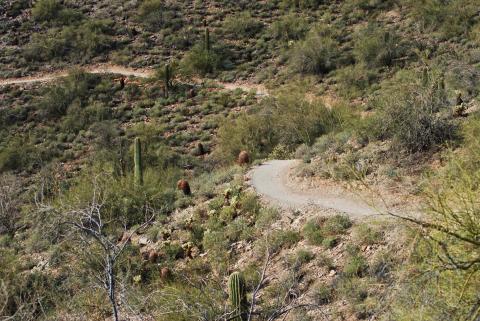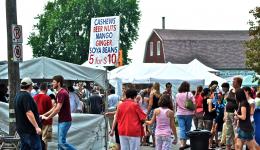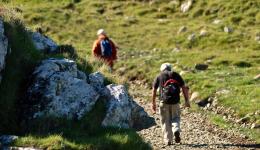Category:
Mark 6:33 – 44
30 The apostles gathered around Jesus and reported to him all they had done and taught. 31 Then, because so many people were coming and going that they did not even have a chance to eat, he said to them, “Come with me by your selves to a quiet place and get some rest.”
32 So they went away by themselves in a boat to a solitary place. 33 But many who saw them leaving recognized them and ran on foot from all the towns and got there ahead of them. 34 When Jesus landed and saw a large crowd, he had compassion on them, because they were like sheep without a shepherd. So he began teaching them many things.
35 By this time it was late in the day, so his disciples came to him. “This is a remote place,” they said, “and it’s already very late. 36 Send the people away so that they can go to the surrounding countryside and villages and buy themselves something to eat.”
37 But he answered, “You give them something to eat.”
They said to him, “That would take more than half a year’s wages! Are we to go and spend that much on bread and give it to them to eat?”
38 “How many loaves do you have?” he asked. “Go and see.”
When they found out, they said, “Five—and two fish.”
39 Then Jesus directed them to have all the people sit down in groups on the green grass. 40 So they sat down in groups of hundreds and fifties. 41 Taking the five loaves and the two fish and looking up to heaven, he gave thanks and broke the loaves. Then he gave them to his disciples to distribute to the people. He also divided the two fish among them all. 42 They all ate and were satisfied, 43 and the disciples picked up twelve basketfuls of broken pieces of bread and fish. 44 The number of the men who had eaten was five thousand.
And so we read once more the familiar story of Jesus feeding the five thousand. It is a lovely story, exhilarating really; some may even find it frightening. I say, frightening, in the knowledge that we Christians today are also called to be disciples of this Jesus. Whether we see miracles or not, whether we are simply faithful in service, faithful in prayer and in good works and in attempting great things for God, we too are among those privileged and called to enter and share in the life of the Kingdom, as followers of Jesus Christ.
Inscribed on the Statue of Liberty where it stands on Bedloe’s Island in New York’s harbor, are these words: “
Give me your tired, your poor,
Your huddled masses yearning o be free,
The wretched refuse of your teeming shore.
Send these, the homeless, tempest-tossed, to me;
I lift my torch beside the golden door.
What a wonderful welcome to the United States! What an awesome task and privilege for the Christian church, for it is our privilege to help make these, otherwise mere, sentiments, certain and real – here in Canada as well.
Mother Teresa said, “We all long for heaven where God is, but we have it in our power to be in heaven with Him right now, to be happy with Him at this very moment; for being happy with Him now means: loving as He loves, helping as He helps, giving as He gives, serving as He serves, rescuing as He rescues, being with Him for all of the 24 hours, touching Him in his distressing disguise.”
“Look at your world – look around you!” Says Jesus. “Look at those in need, the broken and the despairing. And you – YOU! do something about it. You feed them.”
But we know we cannot, for we are weak and powerless; without the necessary resources. But still the words of Jesus echo from the Kingdom and through the ages – “You feed them! You heal them! You clothe them! You visit them in prison!”
Dr. Andrew McRae, a past principle of Acadia Divinity College in Nova Scotia, once made these remarks: “it is almost useless to be known as against everything; against pornography, divorce, abortion, prostitution and poverty – compared with being for: a liberating, fulfilling, renewing Christian lifestyle. I am more interested in Christians reaching the prostitute for a new life in Christ than I am in getting her off the street, when many of them have been driven there by broken homes, personal abuse, and the like, and are often more sinned against than sinning.”
Sometimes Christians find it easier to believe in the miracles of the first century when Jesus was here on earth than they do in the possibility that miracles may happen today; that Jesus, by the power and presence of his Holy Spirit, would continue to do amazing things in and through his Body, the church.
A few years ago, Rebecca Chao reported that on her trips to visit house churches in China, she frequently heard stories of food being ‘multiplied.’ Likewise, Paul Landrey also told of a Christian convention he attended in India where bananas were multiplied. And, Kurt Koch documented the multiplication of meat, rice and bananas, in Indonesia, relating how an evangelistic team of 15 was given nine bananas that they carried for some distance before stopping to eat and finding that there was now 15 bananas – one for each team member. Rex Gardner has cited a case of flour being multiplied in an orphanage in 18th century France. Herbert Thurston, a Jesuit, conducted an objective study of the multiplication of food in his book, “The Physical Phenomena of Mysticism.” He concluded – “It would be an endless task to try to compile a list of devout people in whose lives such multiplication of food are recorded.” In investigations prior to the official beatification of individuals, in making them ‘official’ Saints of the church, the Roman Catholic Church has frequently documented such incidents.
Father Richard Thomas of El Paso, Texas, is one known example from the United States. It began on Christmas in 1972. Through a Bible study in a youth centre, Rick Thomas was impressed by the Lord to serve a Christmas dinner at the garbage dump in Juarez, Mexico. The guests were to be the poorest of the poor, those who lived as scavengers at the dump. They prepared 120 Mexican burritos with tamales, and ham, chocolate milk and some fruit. The food might possibly have stretched for 150 – but almost 300 people showed up. Yet, not only did the food reach, but also each person received a slice of ham, as thick as their hand. Thomas reported that “all ate their fill and many took bags of groceries away with them. There was more than enough; in fact, they left food at three orphanages on the way home.”
In a book–length study of Richard Thomas’s ministry in El Paso, René Laurentin painstakingly chronicled other instances of the multiplication of food. There was multiplication of flour in December 1975, multiplication of grapes in July 1977, distribution of avocados and tortillas in December of 1977; distribution of canned milk, January 1978; distribution of grapes in July 1979, and the abnormal filling of sacks with squash in April, 1980.
I am going to stop because this is hard to believe. I share with you a world-view clash. I too doubt all of this; I am not sure that I can believe it, nor even that I want to. Our worldview simply will not allow for such miracles in our present time. Our rational, scientific, philosophical training cries out – ‘This is a logical impossibility; in fact absurdity.’
Heirs of the enlightenment (and that’s not all bad), from our earliest days of education and formation in the West, we have learned to be skeptical, questioning, logical and rational about the world around us. This is not the way the real world is, this story; nor these stories – not what happens; not how the real world functions at all. Or so we think. Most of us, like the disciples in the story, are limited by our limited worldview. It takes work of grace and of the Spirit for our minds to be opened, converted and renewed, for us to gain Biblical eyesight and perspective.
We are so afraid of being thought weird, unscientific, relics of a superstitious time. And so, the world around us, as St. Paul put it, indeed has ‘squeezed us into its mold.” We may look back at those plummy times of faith when Jesus was on earth and conclude that such things could very well have happened, or at least, perhaps they did. We may even conclude that it was not mere superstition, or the perspective of ignorance in a long-since, set-aside, worldview of the gullible. But really: it would have been just as difficult for the disciples to accept that Jesus could feed 5000 people, that he would do so before them. They were present, yet hardly believing; right there, but not understanding what was going to happen; not believing when it did.
And yet, it is possible for us to come awake to all of this, to have our eyes more widely opened, our hearts expanded, and our hands ready to respond to the needs of people around us today. It is possible for us to be better servants; but first we have to believe that God still does what seems to us, otherwise, impossible. We can learn to minister better, how better to pray; learn how to heal and to deliver people from all the things that ail them both physically and spiritually. We can learn how to do good, how to live a life pleasing to the Father, learn how to appropriate the means of grace that He has lavished upon the Church through his Spirit for such responsive action; learn how to rest in, abide in, and rely upon God’s life-giving Spirit, poured out upon the Church so that each local ‘community of love’ might properly serve God and our fellow humans on this planet. And, it may be, that even we will see some such miracles, as we too trust and obey – or, rather, first obey so that we may come to believe.
The first century saw a way of learning in the Jewish community called the rabbinic model. More like apprenticing, it was on-the-job learning, training, praxis and experience. It was not textbook stuff involving classrooms with attending boredom. The apprentices lived their lives together, shared and communal, they lived in the company of the Rabbi they were following and with whom they were learning. Christianity is living life with Jesus, in community with brother-and-sister disciples of the Master, trusting that He remains alive and well, and living (and ministering) where we are, daily.
Jesus says to us today, as he did to his first century apprentice–followers: “Follow me. YOU! Come. Follow. Me. And I will make you to be . . . Come and see, come and learn, come and be my disciples.” Jesus makes us what He will make of us, in His presence with other followers. We learn and experience what that is – by being His disciples, following closely, hardily, nearly-by.
We hesitate. What will it be like? What will we actually do? Will it be difficult? Will it hurt? Will we be embarrassed? Will it cost too much?
“Come and see,” says Jesus. He does not make it easy, does not fill in the blanks, does not answer our questions or accommodate are wondering and our fearful questions. He says, “I am the Way; come and join me in this Way, on the Way.” He says, “I am the Truth; come and learn the Truth – what is real, from me.” And he says, “I am the Life; come and share Life with me. It is something that I call ‘abundant’.”
There are lots of courses on leadership; few if at all, on follower-ship. Perhaps we will get better at this business of following, so that we will truly be Jesus’ disciples. It will not be easier, but it can be better. ‘We believe – Lord, help our unbelief. We want to follow more nearly and love You more dearly. God help us.’ Yes it will call for sacrifice – we know that. But most of all it calls for faith and obedience, for vulnerability and availability, for openness to the Master.
Feeding 5000 and more . . . This story gives several principles to note.
We can learn to love more dearly.
Jesus was moved to minister to the people gathered, out of heart-felt and deep love and compassion. The One who calls and enables us was tenderhearted, forgiving others. So also may, and must, we be. The phrase “moved with compassion,” is found often as Jesus goes about healing and teaching, performing miracles, raising the dead and expelling demons. God’s mercy goes before his action; Jesus’ mercy frequently precipitated his work.
We can learn to look and listen more closely.
We need to be attentive to the Father, to what He is doing and to what He would ask of us and do through us. We need to listen to the silent cries of desperate people, and see their beckoningcalls for help. The poet puts it this way, challenging us to listen and then to speak “so straining ears, with world–din racked and torn, may catch what God doth say.” If we do, we will discover those divinely appointed occasions when God will choose to work despite our frail faith and reluctant obedience, despite our struggling hopes and through our meager acts of love.
Listening, attentive to the words of the Heavenly Father and in communion with the Holy Spirit, Jesus knew that He was not to yield to the apostles wish to send the crowds away that day. Says Frederick Buechner, “We are so used to hearing what we want to hear and remaining deaf to what it would be well for us to hear, that it is hard to break the habit. But if we keep our hearts and minds open, as well as our ears, if we listen with patience and hope, if we remember at all deeply and honestly, then I think we come to recognize, beyond all doubt, that however faintly we may hear him, he is indeed speaking to us, and that, however little we may understand of it, his word to each of us is precious beyond telling.”
“Send the crowd away!” Of course that would have been the logical thing to do. Observing the hunger of the people and measuring that against the lack of immediate resources to feed them, the disciples in their wisdom concluded that to disperse them would of course be best. They looked around at so many gathered and listened to their own inner voices of reason. But Jesus command to them was reflecting the word of the Father – ‘Feed them.’
Sometimes we must ignore the words of others and the voice within. We are, as is our world of acquaintances, so easily faithless and pessimistic, cynical and skeptical about so much in all around us. ‘It cannot be done; we cannot afford it; it does not make sense.’
It is one thing, understandable really that unbelievers do not understand “the foolishness” of spiritual things; but it is quite another that so many of Jesus’ followers do not understand, either. It is discouraging when the Church, the very Body of Christ that claims Jesus as its Head, frustrating that professed believers, too, have very little faith by which to appropriate God’s resources in the midst of such challenges and opportunities. Access to Life in the Kingdom, and to the King, should prepare us for growing participation in Kingdom principles, priorities and power. Jesus listened to the Father and not to the disciples – and the miracle was performed.
We can learn to obey more fully.
Jesus gave instructions and they were obeyed. It was not that the disciples understood what they were doing nor the meaning of that day’s events, nor what the results would be. They obeyed despite the obvious lack and inadequacy of the resources they could manage to find. “You give them something to eat,” Jesus had commanded. They went looking, scrambling and scratching about to find a natural, normal solution. This was opportunity to re-examine their resources but what did they find? –nothing but a small lad’s lunch consisting of five loaves and two fish. This was a crucial moment for they were being told to bring what they had, what they could find, but also do something beyond them, for which clearly they did not have adequate resources; in fact, they hardly had any resources at all.
When we know that our own resources are lacking, exceedingly small, and that we ourselves are inadequate and weak, we find the crucible in which faith may be forged. Jesus told them to organize the crowd in groups of hundreds and fifties. Having no idea where the food was going to come from, still they were to make preparations “as if” it would surely appear. We are not told, but did they think that God would provide for his people in this situation, in that remote and barren place, as he had for his Old Testament people during their wanderings in the desert, following the Exodus from Egypt? Having no idea where the food was to come from, nevertheless they obeyed and began to prepare the people to receive. We too are to obey when we hear Jesus voice calling us in the direction of the impossible, when every thing that needs to happen – well, when we cannot see how it is going to happen. But we are to try to trust and obey, anyway.
We can learn to obey. Obedience in the Christian life is the difference between wandering and journeying. The miracle of the multiplication of bread and fish probably occurred in the apostles’ hands as well as in the hands of Christ, as He gave thanks and distributed it to each of them for the handing out. The miracle comes to and through us, for we are the servants of Christ, His Body that demonstrates to the world His presence, hands and feet, and minister to our world the provision of God.
Perhaps each disciple was handed a mere and meager portion, a few crumbs of the bread and fish. And then each one began to move into the crowd and pass out the meager repast. But as each one did that, the multiplication occurred before his eyes. The crowd may not have known that the food was in such short supply, so scarce and limited the resources. The crowd got the food; the disciples were to gain something more, for they could perceive that the miracle was happening at and through their very hands. Only God can work such works and do such miracles, but he does it through the hands of disciples who comprise the community of love, the church. O to get in on the blessing of God working in and through us!
We must not give up in discouragement, because Jesus will not give up on us. Yes, we find it hard to trust and obey, to believe and to act – especially when God calls us into our own impossible situations. And yet, the authority and power of the Kingdom is our Lord’s and He wants to continue His work on earth through us, straggling and struggling as we do, faithless as we may so often be, prone to wander rather than to follow, choosing often to opt out rather than to obey. And yet, Jesus’ love and mercy are great – for us and for our world. And so He continues to call us and to ask us to feed those around us.
We need sustenance and food and so does our world. Jesus is the link on earth from the glorious Kingdom Realms, the One who has all power and authority in Heaven and on earth. And He Heads the Church. And, as we follow Him as our Master and Lord, He continues His work of love – continues to break our few bread and fish crumbs, for us to share with the many around us.
Let us continue to walk along with Him, continuing in the ‘school of obedience’ with this loving Master. Let us try to draw even closer to Him by faith through all the means of grace He has given, so that we may receive even more of his bounteous provision — and share it with others.









